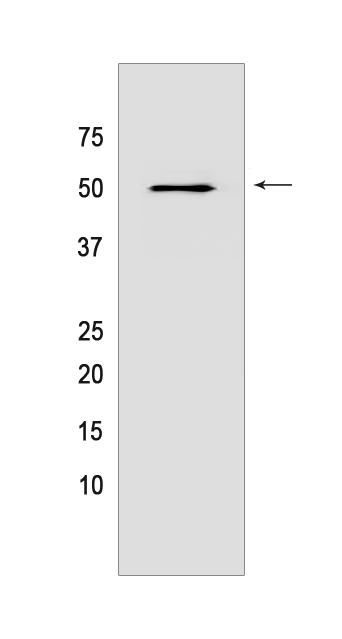CLN3 Mouse mAb[93O8]Cat NO.: A69781
Western blot(SDS PAGE) analysis of extracts from HeLa cells.Using CLN3 Mouse mAb IgG [93O8] at dilution of 1:1000 incubated at 4℃ over night.
Product information
Protein names :CLN3,BTS,CLN3_HUMAN,Battenin
UniProtID :Q13286
MASS(da) :47,623
MW(kDa) :50kDa
Form :Liquid
Purification :Protein A purification
Host :Mouse
Isotype :IgG
sensitivity :Endogenous
Reactivity :Human
- ApplicationDilution
- 免疫印迹(WB)1:1000-2000
- The optimal dilutions should be determined by the end user
Specificity :Antibody is produced by immunizing animals with a synthetic peptide of human CLN3.
Storage :Antibody store in 10 mM PBS, 0.5mg/ml BSA, 50% glycerol. Shipped at 4°C. Store at-20°C or -80°C. Products are valid for one natural year of receipt.Avoid repeated freeze / thaw cycles.
WB Positive detected :HeLa cells
Function : Mediates microtubule-dependent, anterograde transport connecting the Golgi network, endosomes, autophagosomes, lysosomes and plasma membrane, and participates in several cellular processes such as regulation of lysosomal pH, lysosome protein degradation, receptor-mediated endocytosis, autophagy, transport of proteins and lipids from the TGN, apoptosis and synaptic transmission (PubMed:10924275, PubMed:18817525, PubMed:18317235, PubMed:22261744, PubMed:15471887, PubMed:20850431). Facilitates the proteins transport from trans-Golgi network (TGN)-to other membrane compartments such as transport of microdomain-associated proteins to the plasma membrane, IGF2R transport to the lysosome where it regulates the CTSD release leading to regulation of CTSD maturation and thereby APP intracellular processing (PubMed:10924275, PubMed:18817525). Moreover regulates CTSD activity in response to osmotic stress (PubMed:23840424, PubMed:28390177). Also binds galactosylceramide and transports it from the trans Golgi to the rafts, which may have immediate and downstream effects on cell survival by modulating ceramide synthesis (PubMed:18317235). At the plasma membrane, regulates actin-dependent events including filopodia formation, cell migration, and pinocytosis through ARF1-CDC42 pathway and also the cytoskeleton organization through interaction with MYH10 and fodrin leading to the regulation of the plasma membrane association of Na+, K+ ATPase complex (PubMed:20850431). Regulates synaptic transmission in the amygdala, hippocampus, and cerebellum through regulation of synaptic vesicles density and their proximity to active zones leading to modulation of short-term plasticity and age-dependent anxious behavior, learning and memory (By similarity). Regulates autophagic vacuoles (AVs) maturation by modulating the trafficking between endocytic and autophagolysosomal/lysosomal compartments, which involves vesicle fusion leading to regulation of degradation process (By similarity). Participates also in cellular homeostasis of compounds such as, water, ions, amino acids, proteins and lipids in several tissue namely in brain and kidney through regulation of their transport and synthesis (PubMed:17482562)..
Tissue specificity :Expressed in the cortical brain, pancreas, spleen, and testis with weaker expression in the peripheral nerve (at protein level). Highly expressed in gray matter (at protein level)..
Subcellular locationi :Lysosome membrane,Multi-pass membrane protein. Late endosome. Lysosome. Golgi apparatus. Golgi apparatus membrane. Golgi apparatus, Golgi stack. Golgi apparatus, trans-Golgi network. Cell membrane. Recycling endosome. Membrane raft. Membrane, caveola. Early endosome membrane. Cell junction, synapse, synaptosome. Late endosome membrane. Cytoplasmic vesicle, autophagosome.
IMPORTANT: For western blots, incubate membrane with diluted primary antibody in 1% w/v BSA, 1X TBST at 4°C overnight.


